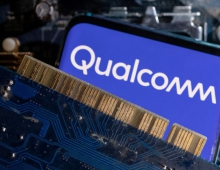
Chinese Antirust Authorities Fined Qualcomm
Qualcomm announced on Monday a settlement with Chinese authorities related to an investigation into anti-competitive practices. As part of the settlement, Qualcomm has agreed to pay a fine of $975 million (6.088 billion Chinese Yuan).
The deal also requires Qualcomm to lower its royalty rates on patents used in China, the U.S. chip-maker said in a statement.
Qualcomm cut its full-year earnings estimate because of the fine, which it said would cost it about 58 cents per share, but it raised the lower end of its revenue forecast slightly.
As part of the settlement with China's National Development and Reform Commission (NDRC) officials, Qualcomm will not dispute China's finding that it violated the country's anti-monopoly law, and it will offer licenses to its current 3G and 4G essential Chinese patents - widely used by Chinese device makers - separately from other patents.
"We are pleased that the investigation has concluded and believe that our licensing business is now well positioned to fully participate in China's rapidly accelerating adoption of our 3G/4G technology," said Derek Aberle, president
of Qualcomm. "We appreciate the NDRC's acknowledgment of the value and importance of Qualcomm's technology and many contributions to China, and look forward to its future support of our business in China."
Microsoft and otehr companies have also come under investigation in China for allegedly anti-competitive practises.
But even after agreeing to pay a record fine in China, Qualcomm faces big challenges in its most important market.
As low-cost, low-margin Chinese smartphone manufacturers such as Xiaomi and Huawei Technologies push into other developing markets, they are driving down average handset prices. Qualcomm collects royalties based on the handset's value.
Qualcomm is also under increasing competition from MediaTek and a handful of small Chinese chipmakers that specialize in making chips for low-priced phones.
Intel is also eyeing a comeback in the mobile market after striking an alliance with the Chinese government, saying in September it would invest up to $1.5 billion in state-owned chipmaker Spreadtrum to jointly develop processors.





















